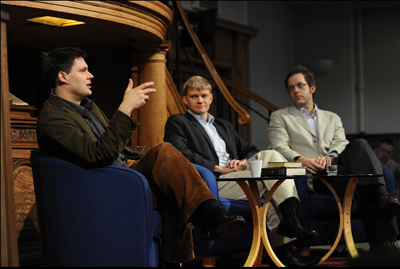True or False?
A Conference held at Charlotte Chapel Church Edinburgh on the Reliability of Scripture

Photo by Andrew Robertson
Every few years there is another best-selling book apparently disproving the Bible such as Dan Brown's The Da Vinci Code . In order to challenge such speculation and affirm the truth of the Bible, a team comprising Dr Peter J Williams and Dr Dirk Jongkind of Tyndale House and Dr Simon Gathercole of Cambridge University took part in a day conference titled ‘True or False' at Charlotte Chapel, Edinburgh , on 29 January 2011.
Dr Williams posed the question ‘Can we trust the history of the New Testament?' and demonstrated several methods to test the reliability of Scripture, including the analysis of popular Jewish names of the time and their frequency of occurrence within the Gospels. In light of the accuracy in such details and the way they dove-tail together across the four Gospels we can be confident that they are true accounts. Listen to audio
Dr Jongkind explained why we know the Greek texts to be true. He said there were some alterations in the manuscripts we have, for example Luke 2:33 is one instance in which some scribes changed the text in order to avoid giving support to a heresy known as ‘adoptionism'. However, he warned against using minor changes as an excuse to reject the overall integrity of Scripture. Listen to audio
Dr Gathercole looked at the differences between the New Testament Gospels and the non-canonical gospels, such as Thomas, Judas and Philip. Their key characteristic is that salvation is not attained by the death and resurrection of Christ, but instead by knowing the ‘deep revelation' behind the ‘mysterious sayings of Christ', the ultimate goal being for the soul to escape the ‘prison of the body'. The gospel of Philip has become the most well known, infamous for giving rise to the conspiracy theories concerning Mary Magdalene and Jesus, whereas in reality the manuscript is so fragmented at this point that the actual text is totally speculative. In the non-canonical gospels there is no mention of the places Jesus visited; they show in their content a separation from Jewish culture, and they criticise the God of the Old Testament. The New Testament Gospels are depictions of Jesus rooted in time and space naming real places, real festivals and real people, written within the lifetime of eyewitnesses who could confirm their accuracy.
Question and Answer Session Listen to audio